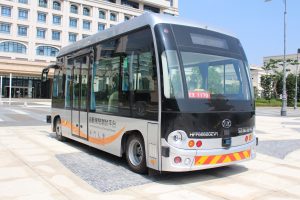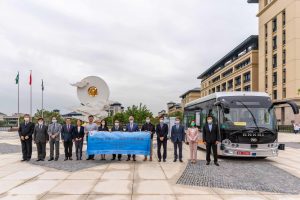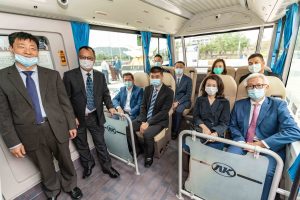The University of Macau (UM) held a launch ceremony for Macao’s first Autonomous Driving Bus Testing Platform today (23 October), marking that the first autonomous bus has become operational in Macao. The autonomous bus will run on the UM campus on a trial basis. During this period, data will be collected for analysis in preparation for future testing on public roads in Macao.
UM Rector Yonghua Song said at the ceremony that intelligent transport represents the future of the automotive industry, and countries around the world are in a race to develop automotive technology. This testing platform is an efficient transport system based on multiple technologies and mainly aims to tackle the issue of how to use driverless buses as a mode of public transport in congestion-prone areas in Macao. UM will industrialise innovative technologies from the project in order to promote smart city development in Macao and the Greater Bay Area.
According to Chan Wan Hei, president of the Administrative Committee of Macao Science and Technology Development Fund (FDCT), UM has a solid foundation and world-class researchers in the field of smart cities and the internet of things. The establishment of the State Key Laboratory of Internet of Things for Smart City promotes talent training and research in related fields as well as the implementation of urban innovation. The autonomous driving project will help UM improve its research capacity in cutting-edge disciplines and promote the transformation of research results into economic benefits as well as industry-academic collaboration. He expressed hope that in addition to autonomous vehicle research, UM would also carry out research in transport planning and real-time traffic management using urban big data, so as to accelerate the process of developing Macao into a smart city.
The project was headed by Prof Xu Chenzhong, dean of the FST, interim director of the Institute of Collaborative Innovation, and chair professor in the Department of Computer and Information Science and State Key Laboratory of Internet of Things for Smart City. According to Prof Xu, since the launch of the project, 31 related papers have been published, 15 in journals and 16 at international conferences. Two of these papers have been accepted by top international conferences in the field of artificial intelligence. The outstanding results are thanks to the cooperation of various partners. He looks forward to deepening the collaboration with UM’s partners in autonomous driving research. The following individuals also delivered speeches at the ceremony: Liu Fan, executive deputy dean of Baidu ABC Institute, Beijing Baidu Network Technology Co, Ltd; Li Huiyun, deputy director of the Institute of Integrated Technology and director of the Automotive Electronics Research Centre, under the Shenzhen Institutes of Advanced Technology, Chinese Academy of Sciences (CAS); Mu Yi, board director and executive vice president of Haylion Technologies; and Declan Leong, vice president (network services) of CTM.
The project uses artificial intelligence, big data processing, internet of things technology, cloud computing, and other technologies to collect data (such as traffic signals and data about pedestrians and vehicles on the road), to ensure that the bus runs safely and reliably in an open and uncertain environment. The bus is 6.6 metres long and can carry up to eight passengers. There are two modes, the manual mode and the autonomous mode, to suit different needs. In the autonomous mode, the bus can detect static and dynamic obstacles as well as traffic signs, such as vehicles, pedestrians, zebra crossings, and traffic lights, and it can slow down or stop according to actual conditions. The autonomous bus can also change lanes and stop at bus stops. Its maximum speed is 40km/h, which meets safety requirements for public buses. UM will open the autonomous bus for free trial ride subject to prior online registration.
The project is the key R&D project funded by the Macao Science and Technology Development Fund under its Key R&D Programme (file number: 0015/2019/AKP). It was jointly conducted by UM’s Faculty of Science and Technology and State Key Laboratory of Internet of Things for Smart City, as well as several leading research institutions in the field in mainland China, including the Shenzhen Institutes of Advanced Technology under the CAS, Baidu, and Haylion Technology. CTM also played an active part in the project, providing UM with high-quality and stable mobile network technology.
Other individuals who attended the ceremony include Li Yan, policy section chief under the Economic Affairs Department of the Liaison Office of the Central People’s Government in the Macao SAR; Che Weng Keong, interim director of the Higher Education Bureau; Chan Hon Sang, deputy director of the Economic Bureau of Macao; Ip Chong Wa, member of the Administrative Committee of the CTT; Ge Wei, vice rector of UM; Lo Ka Meng,interim head of the Vehicle and Driver-Related Affairs Department of the Transport Bureau; Poon Fuk Hei, chief executive officer of CTM; and Yang Zhixin, director of the Research Services and Knowledge Transfer Office at UM.
澳門大學今(23)日舉行“澳門自動駕駛巴士測試平台”啟動儀式,標誌著澳門首台自動駕駛巴士正式啟用,澳大科研成果轉化又一突破。自動駕駛巴士將在澳大校內試行,期間收集行駛數據作分析研究,為將來於澳門公共道路行駛做準備。
澳大校長宋永華致辭時表示,作為未來汽車工業發展的必然趨勢,開發自動駕駛車輛技術已趨向世界性潮流,全球大國皆參與當中研發,陸續落地試運行。澳大的自動駕駛巴士測試平台結合多項技術形成「人、車、路」高效運行的交通體系,並著重攻克如何將自動駕駛巴士作為大眾運輸應用在澳門複雜擠堵的交通場景。澳大會以具影響力和創新的重點研究成果轉化,服務公眾,進一步強化大學在澳門的服務領域,為澳門乃至大灣區的智慧城市的大眾運輸寫下新的篇章。
澳門科學技術發展基金行政委員會主席陳允煕致辭時指,澳大在智慧城市及物聯網領域具備紮實的基礎,也有一流的研究人員,配合智慧城市物聯網國家重點實驗室的設立,將促進有關領域的人才培養和研究,逐步引領開展城市創新實踐。自動駕駛項目有利於大學提升前沿學科的科研水準、激發科技成果轉化為經濟效益,為推動產學研發展邁進一步。同時,期待澳大在自動駕駛方面的研究以外,也通過城市大數據開展交通規劃以及交通實時引導方面的研究,加快推進澳門構建智慧城市。
澳大科技學院院長、協同創新研究院代院長兼電腦及資訊科學系講座教授須成忠領導進行是次研究項目。他介紹指項目自啟動以來共發表期刊論文15篇和國際會議論文16篇,當中2篇更獲國際頂尖人工智能學術年會取錄,取得傲人成績有賴各單位通力合作,期待未來繼續深化自動駕駛的技術研究。此外,北京百度網訊科技有限公司百度雲智學院常務副院長劉釩、中國科學院深圳先進技術研究院集成技術研究所副所長兼汽車電子研究中心主任李慧雲、深圳市海梁科技有限公司董事兼常務副總裁穆毅和澳門電訊網絡服務副總裁梁沛雄亦分別致辭。
自動駕駛巴士項目成功利用人工智能、大數據處理、物聯網、雲計算等多種技術收集道路訊息(如交通信號、路上行人及車輛),令巴士可在開放及不確定環境下,安全可靠地行駛,使其與環境聯成一體,形成“人、車、路”高效運行的交通體系。自動駕駛巴士長6.6米,目前可以搭載8名乘客,具備人工和智能駕駛兩種模式,可根據實際需求切換。在自動駕駛模式下,巴士可以檢測靜態、動態障礙物及交通標示如車輛、行人、斑馬線及交通燈號,可按實際情況減速或停車。巴士也具備自主變道、自動停靠巴士站等功能,車速不超過40km/h,安全及穩定性符合公交運行的要求。澳大將於稍後向師生和公眾開放網上報名,讓大家率先體驗自動駕駛巴士。
研究項目是澳門科學技術發展基金“重點研發專項計劃”(檔案編號:0015/2019/AKP)之一,由澳大科技學院及智慧城市物聯網國家重點實驗室聯合內地多間自動駕駛先驅機構如中科院深圳先進技術研究院、百度、海梁科技等研發。此外,澳門電訊也積極參與其中,為澳大提供更優質和穩定的流動網絡技術。
出席啟動儀式的嘉賓還有:中央人民政府駐澳門特別行政區聯絡辦公室經濟部政策處處長李燕、澳門高等教育局代副局長謝永強、澳門經濟局副局長陳漢生、郵電局行政委員會委員葉頌華、澳門大學副校長葛偉、交通事務局車輛及駕駛員事務廳代廳長羅家明、澳門電訊行政總裁潘福禧、澳門大學研究服務及知識轉移辦公室主任楊志新等。
The bus runs on the UM campus on a trial basis
巴士在澳大校園內試行
Macao’s first Autonomous Driving Bus Testing Platform
has been launched at UM
澳門自動駕駛巴士測試平台正式啟動
Guests ride the autonomous bus
嘉賓試坐自動駕駛巴士




